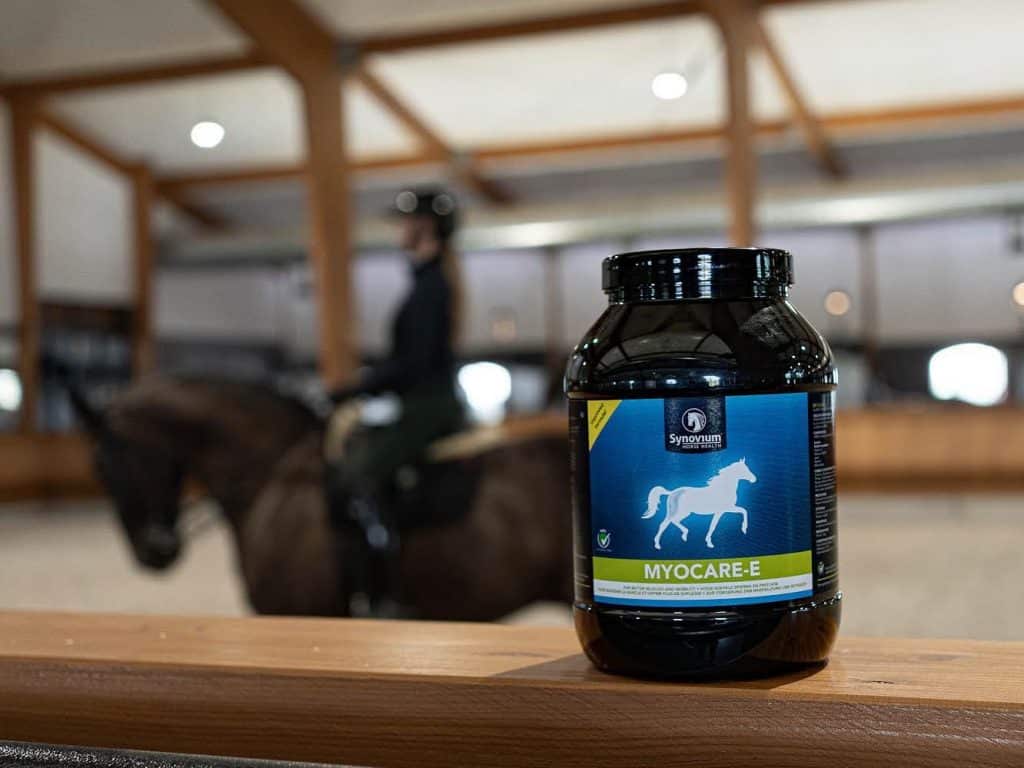In this week’s blog, we will look at PSSM (Polysaccharide Storage Myopathy) in horses, other names given to this syndrome include exertional rhabdomyolysis (ER),or tying-up.
PSSM is classified as a metabolic disease that results in the accumulation of high muscle glycogen and abnormal polysaccharide in skeletal muscles.
We will discuss some of the specific causes and the methods that can be used to prevent repeat episodes.
The commonality clinical signs of PSSM in horses vary, depending on the severity of the episode. Sometimes in mild cases horses can present as stiff after training whereas in severe cases the intense pain could immobilize a horse.
During training PSSM can be recognised when the horse presents with a short, stiff stride that worsens as the horse works. Sometimes they can adopt an unusual stance when standing. It is typically the large muscles of the hindquarters, back, and shoulders that are the most affected.
The affected muscles will be firm to the touch and painful for the horse. The muscles will be palpated when cramping is evident. The pain from tying-up can last for several hours with the horse sweating profusely due to an increased heart and respiratory rate.
In severe cases, horses can pass a dark, red-brown coloured urine (myoglobinuria) due to the presence of a muscle protein called myoglobin.
This happens when there is damage to the muscle fibres and a large amount of myoglobin, along with other muscle proteins, leak into the horse’s blood stream before being excreted through the kidneys.
Additional clinical signs could include depression, dehydration, hyperthermia, and “thumps” (synchronous diaphragmatic flutter), a condition characterized by hiccup-like contractions of the horse’s diaphragm.
PSSM in horses should be distinguished from muscle soreness and strain which is very common in performance horses who overexert themselves.
Exercise in excess of the horses training level, inadequate warm-up, pre-existing lameness, electrolyte depletion, or dietary imbalances will predispose horses to muscle soreness and strain.
These horses usually respond well to rest, and a gradual return to their training regime, as well as balancing the diet.
Diagnosis of PSSM in horses includes:
- Blood work confirming the detection of elevated serum activities of the enzymes creatine kinase (CK), aspartate animotransferase (AST), and lactate dehydrogenase (LDH). Along with myoglobin, these proteins are contained within the muscle cells and are released when muscle cells become damaged during an episode of tying-up.
- A urinalysis is also commonly performed to detect electrolyte imbalances, as well as the presence of myoglobin, which would also indicate tying up.
- Muscle biopsy were samples are taken from the semimembranosis or semitendonosus muscle (hamstring muscles) and examined under a microscope.
Call your vet immediately if you suspect your horse is tying up!
As you wait do the following:
- Keep your horse still as forcing him to move may cause further damage to his muscles.
- Try and keep him calm as stress can make this condition worse.
- Offer him a drink of water with electrolytes.
- Warm up or cool down the affected muscles, according to the season. In cold weather, place a blanket over your horse to warm him up. If it is a hot day sponge your horse down to keep him cool.
- Monitor your horse if your horse urinates while you are waiting for the vet take note of the and if possible, collect a sample.
- Look out for additional clinical signs such as dehydration, hyperthermia, and thumps.
Dark mucous membranes and skin that does not snap back into place after being pinched are signs of serious dehydration.
Hyperthermia results when a horse can no longer cool himself by sweating. Signs of hyperthermia could be agitation, panting, excessive sweating, and skin that is noticeably hot to the touch. A horse who is exhausting his fluid reserves may develop anhidrosis, the loss of the ability to sweat.
Thumps will present itself as a distinctive jerking, in your horse’s flank that matches the rhythm of his heartbeat.
If you notice any of these other signs starting to develop. Call your vet with an update; so they can decide if your case is becoming critical.
There are two types of tying-up sporadic exertional rhabdomyolysis refers to horses that experience an episode of tying-up on rare occasions and chronic exertional rhabdomyolysis refers to a horse that experiences repeated episodes of tying up.
Management of the disease
Research has shown that management for all types of tying-up, regardless of the cause, can significantly improve the welfare for these horses. If the horse is overweight aiming to reduce and maintain a body condition score (BCS) of 5 on a 1-9 scale will be beneficial.
You should customise a diet where the muscle will burn the excess glycogen instead of storing it. Do not restrict forage intake and if additional energy is required research the ingredients and choose feeds with a combined starch & sugar content of less than 10%.
Electrolyte imbalances within the individual horse rather than the diet may also be a concern in which case your vet may recommend a Fractional Electrolyte Excretion test.
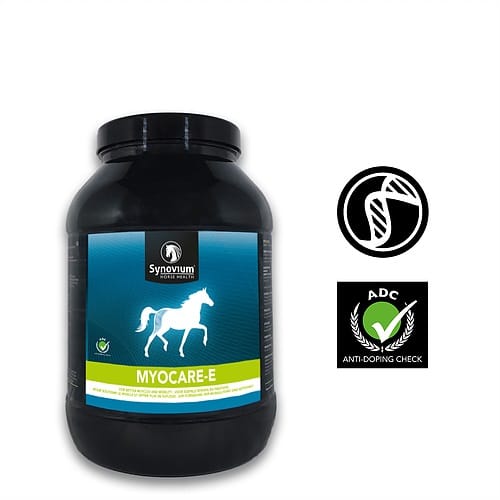
SYNOVIUM® MYOCARE-E is an innovative muscle supplement supporting muscle physiology.
Myocare-E can help support essential body cells during hard exercise with a unique formula of Natural Vitamin E, Natural Selenium, HMB (β-Hydroxy β-Methylbutyric Acid), Lysine and Beta Alanine. A unique supplement aiding in optimal muscle physiology, muscle development, suppleness, power, and recovery.
Our vets have developed a new and improved formula for our Myocare-E following recent studies and clinical trials. We have added extra natural Vitamin E (d-α-tocopherol), a powerful antioxidant essential to the horse to keep the muscles and nerve cells functioning smoothly. Combined with natural Selenium for optimal support against free radicals to help protect the muscles from oxidative damage.
The only biologically active form of vitamin E is α-tocopherol. The natural form, d-α-tocopherol, is more bioavailable, more easily absorbed and has greater antioxidant activity than the synthetic form, dl-α-tocopherol (also called all-rac-α-tocopherol). It is not recommended to use the synthetic product in any dosage as it is not effective in increasing the vitamin E level in the blood.
Choosing a supplement like Myocare-E provides the correct levels on d-α-tocopherol vitamin e required to support horses with PSSM.
Our new formula also contains HMB (β-Hydroxy β-Methylbutyric Acid) a metabolite of the amino acid Leucine.
Scientifically proven to support the process by which the muscles repair and recover following exercise.
HMB helps prevent muscle damage and breakdown. Combined with the essential amino acid Lysine to support muscle development.
A small amount of Arginine has been added as it can decrease with Lysine intake, so this way we keep the balance exactly right for the horse.
Beta Alanine is formed into Carnosine in the horses body to help buffer acidification in the muscles.
Supplementation of Beta Alanine helps increase the amount of Carnosine available in the muscles to help improve the absorption of lactic acid and therefore build up.
Keeping the muscles working at maximum output for longer and improving recovery.
Click on the link for more information: Myocare-E
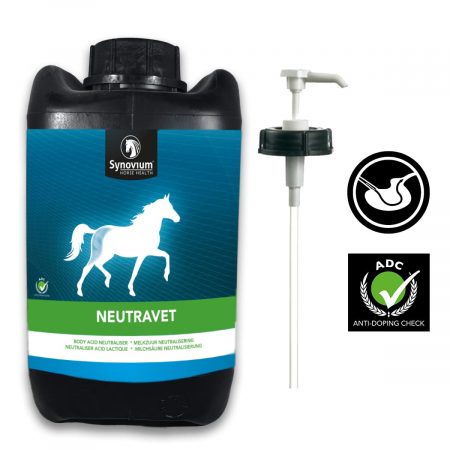
Synovium® Neutravet
Professional veterinary supplement to support against lactic acid build up in horses.
Sodium Citrate has a neutralising effect on lactic acid which accumulates in the bloodstream and muscle tissues during exercise. Citric Acid helps to buffer when there is an alkaline deficiency or for horses with a low ph.
Collection of lactic acid in the blood and muscles can lead to stiff muscles, muscle cramping and damage to muscle fibres. Synovium Neutravet provides to ideal balance to keep horses performing at their best.
Click on the link for more information: Neutravet
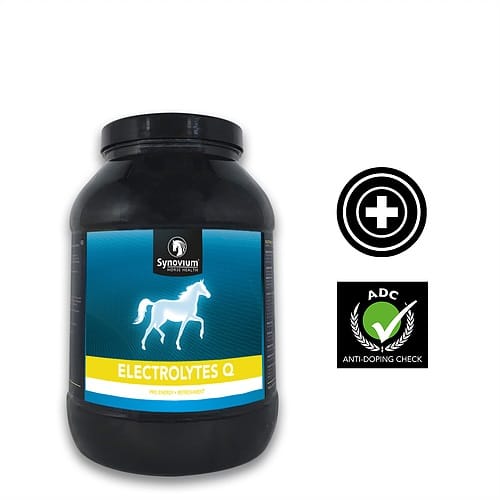
SYNOVIUM® ELECTROLYTES Q is a well-balanced and complete supplement of electrolytes for horses offering optimal hydration support when given regularly. Designed to help replace electrolytes lost during warm weather and exercise, including training and competition.
Restoring the electrolyte balance in horses and with added antioxidants, Synovium® Electrolyte Q supports fast and optimal recovery of the body. A palatable supplement that contains all the key electrolytes sodium, chloride, potassium, calcium and magnesium.
Click on the link for more information: https: Electrolytes Q
It is also important to implement a structured training programme, regularly exercising, taking care to warm up and cool down properly before and after exercise. Provide as much turnout as possible but manage access to grazing in a similar way to a laminitic.
It has been recommended that horses that are prone to tying-up benefit from vitamin E and selenium supplementation. These antioxidants can reduce the severity of exercise-induced free radical damage to muscle cells.
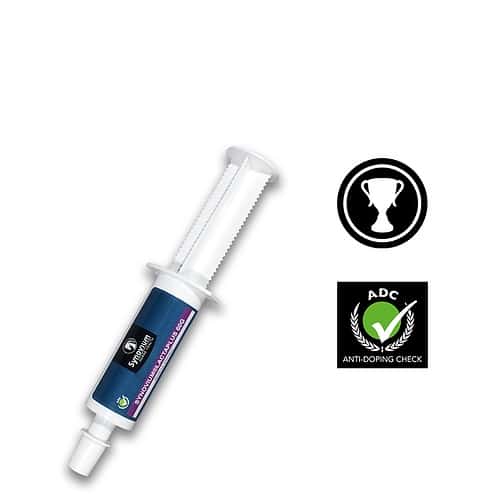
Quick muscle recovery when most needed!
SYNOVIUM® LACTAPLUS PASTE is suitable for horses undergoing intense physical exertion. Designed to help protect against lactic acid build up and speed up recovery. Contains L-Carnitine an essential cofactor in muscle metabolism and muscle energy.
Synovium® Lactaplus Paste supports maximum performance by utilising muscle energy and ensuring optimal functionality of the muscular apparatus. Helps guards body cells from stressors and supports faster recovery.
Is quickly absorbed and ideally should be given just before exercise.
Click on the link to find out more: Lactaplus Paste

